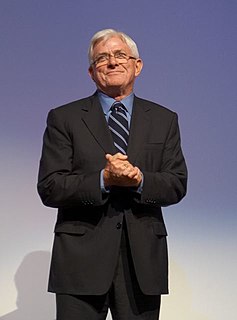Top 582 Superstition Quotes & Sayings - Page 10
Explore popular Superstition quotes.
Last updated on April 20, 2025.
In the way that scepticism is sometimes applied to issues of public concern, there is a tendency to belittle, to condescend, to ignore the fact that, deluded or not, supporters of superstition and pseudoscience are human beings with real feelings, who, like the sceptics, are trying to figure out how the world works and what our role in it might be. Their motives are in many cases consonant with science. If their culture has not given them all the tools they need to pursue this great quest, let us temper our criticism with kindness. None of us comes fully equipped.
I noticed that all the prayers I used to offer to God, and all the prayers I now offer to Joe Pesci, are being answered at about the same 50% rate. Half the time I get what I want, half the time I don't... Same as the four-leaf clover and the horseshoe...same as the Voodoo Lady who tells you your fortune by squeezing the goat's testicles, it's all the same: 50-50. So just pick your superstition, sit back, make a wish, and enjoy yourself.
Through it [Science] we believe that man will be saved from misery and degradation, not merely acquiring new material powers, but learning to use and to guide his life with understanding. Through Science he will be freed from the fetters of superstition; through faith in Science he will acquire a new and enduring delight in the exercise of his capacities; he will gain a zest and interest in life such as the present phase of culture fails to supply.
I’m always intrigued by my nonsensical concern with picking out a bunch of things that look exactly alike the ones that somehow I feel are the best and belong to me. It’s that same crazy urge or superstition, or whatever it is, that makes me open a Bible in a hotel room, hoping for some great happenstance spiritual word of advice. More often than not, I hit a long passage of begats and begots, which contain little inspiration other than the fact that procreation is the highest aim of life.
As long as we cling to the superstition that we must look to government for money supply, instead of requiring it to look to us, just so long must we remain the subjects of government and it is vain to follow this or that policy or party or ism in the hope of salvation. We can control government and our own destiny only through our money power and until we exert that power it is useless for us to debate the pros and cons of political programs.
We debase the richness of both nature and our own minds if we view the great pageant of our intellectual history as a compendium of new information leading from primal superstition to final exactitude. We know that the sun is hub of our little corner of the universe, and that ties of genealogy connect all living things on our planet, because these theories assemble and explain so much otherwise disparate and unrelated information not because Galileo trained his telescope on the moons of Jupiter or because Darwin took a ride on a Galápagos tortoise.
So far as a man may be proud of a religion rooted in humility, I am very proud of my religion; I am especially proud of those parts of it that are most commonly called superstition. I am proud of being fettered by antiquated dogmas and enslaved by dead creeds (as my journalistic friends repeat with so much pertinacity), for I know very well that it is the heretical creeds that are dead, and that it is only the reasonable dogma that lives long enough to be called antiquated.
The so-called Christian nations are the most enlightened and progressive ... but in spite of their religion, not because of it. The Church has opposed every innovation and discovery from the day of Galileo down to our own time, when the use of anesthetic in childbirth was regarded as a sin because it avoided the biblical curse pronounced against Eve. And every step in astronomy and geology ever taken has been opposed by bigotry and superstition. The Greeks surpassed us in artistic culture and in architecture five hundred years before Christian religion was born.
The office of reformer of the superstitions of a nation, is ever more dangerous. Jesus had to work on the perilous confines of reason and religion; and a step to the right or left might place him within the grasp of the priests of the superstition, a bloodthirsty race, as cruel and remorseless as the being whom they represented as the family God of Abraham, of Isaac and of Jacob, and the local God of Israel. That Jesus did not mean to impose himself on mankind as the son of God, physically speaking, I have been convinced by the writings of men more learned than myself in that lore.
Thus, experience has ever shown, that education, as well as religion, aristocracy, as well as democracy and monarchy, are, singly, totally inadequate to the business of restraining the passions of men, of preserving a steady government, and protecting the lives, liberties, and properties of the people . . . . Religion, superstition, oaths, education, laws, all give way before passions, interest, and power, which can be resisted only by passions, interest, and power.
In proportion to the love existing among men, so will be the community of property and power. Among true and real friends, all is common; and, were ignorance and envy and superstition banished from the world, all mankind would be friends. The only perfect and genuine republic is that which comprehends every living being. Those distinctions which have been artificially set up, of nations, societies, families, and religions, are only general names, expressing the abhorrence and contempt with which men blindly consider their fellowmen.
As the astronomer rejoices in new knowledge which compels him to give up the dignity of our globe as the centre, the pride, and even the final cause of the universe, so do those who have escaped from the Christian mythology enjoy their release from the superstition which fails to make them happy, fails to make them good, fails to make them wise, and has become as great an obstacle in the way of progress as the prior mythologies which it took the place of two thousand years ago.
If cathedrals had been universities If dungeons of the Inquisition had been laboratories If Christians had believed in character instead of creed If they had taken from the bible only that which is GOOD and thrown away the wicked and absurd If temple domes had been observatories If priests had been philosophers If missionaries had taught useful arts instead of bible lore If astrology had been astronomy If the black arts had been chemistry If superstition had been science If religion had been humanity The world then would be a heaven filled with love, and liberty and joy
Anyone who has read Yeats's wonderful Autobiography will remember his Sligo shabby, shadowed, half country and half sea, full of confused romance, superstition, poverty, eccentricity, unrecognized anachronism, passion and ignorance and the little boy's misery. Yeats was treated well but was bitterly unhappy; he prayed that he would die, and used often to say to himself: "When you are grown up, never talk as grown-up people do of the happiness of childhood.
The man who believes that the secrets of the world are forever hidden lives in mystery and fear. Superstition will drag him down. The rain will erode the deeds of his life. But that man who sets himself the task of singling out the thread of order from the tapestry will by the decision alone have taken charge of the world and it is only by such taking charge that he will effect a way to dictate the terms of his own fate.
Nothing is so convenient as a decisive argument ... which must at least silence the most arrogant bigotry and superstition, and free us from their impertinent solicitations. I flatter myself, that I have discovered an argument ... which, if just, will, with the wise and learned, be an everlasting check to all kinds of superstitious delusion, and consequently, will be useful as long as the world endures. For so long, I presume, will the accounts of miracles and prodigies be found in all history, sacred and profane.
There is... in our day, a powerful antidote to nonsense, which hardly existed in earlier times - I mean science. Science cannot be ignored or rejected, because it is bound up with modern technique; it is essential alike to prosperity in peace and to victory in war. That is, perhaps from an intellectual point of view, the most hopeful feature of our age, and the one which makes it most likely that we shall escape complete submersion in some new or old superstition.
For men to focus on controlling women's reproduction to solve a society's problems seems nothing short of mad or, at best, superstitious. But men's superstition or insanity has real and dire consequences for the women who are its object. And states, too, home in on women's bodies, perhaps to create the illusion that men are in control of uncontrollable forces. Indeed, almost all governments try to control women's bodies and regulate their appearance in some way.
Science may have come a long way, but as far as religion is concerned, we are first cousins to the !Kung tribesmen of the Kalahari Desert. Except for the garments, their deep religious trances might just as well be happening at a revival meeting or in the congregation of a fundamentalist TV preacher.... As we move further from the life of ignorance and superstition in which religion has its roots, we seem to need it more and more.... Why has religion become a force just when we'd have thought it would be losing ground to secularism?
"Natural" is a very dangerous word to use about sexuality ... Our society's notions of normality are completely fake and meta-trendy, since they rely on the changing standards of superstition, religion, Christianity and gender bias to define themselves. Americans, in particular, exhibit very childish reactions to sexual practices that are new to them, much like little kids who are offered a vegetable they haven't seen before: "That's disgusting!" "But darling, you haven't even tried it!" "I don't care, I hate it, I hate it!
The kernel, the soul ? let us go further and say the substance, the bulk, the actual and valuable material of all human utterances ? is plagiarism. For substantially all ideas are second-hand, consciously and unconsciously drawn from a million outside sources, and daily used by the garnerer with a pride and satisfaction born of the superstition that he originated them; whereas there is not a rag of originality about them anywhere except the little discoloration they get from his mental and moral calibre and his temperament, and which is revealed in characteristics of phrasing.
Let’s be honest. Who here thinks your professors can say what they really believe? It scares me to death, and should scare you too, that the superstition of political correctness rules the halls of reason. What does all of this mean? It means that telling us what to think has evolved into telling us what to say, so telling us what to do can’t be far behind. Before you claim to be a champion of free thought, tell me: Why did political correctness originate on America’s campuses? And why do you continue to tolerate it? Why do you, who’re supposed to debate ideas, surrender to their suppression?
Liberty, next to religion has been the motive of good deeds and the common pretext of crime, from the sowing of the seed at Athens, 2,460 years ago, until the ripened harvest was gathered by men of our race. It is the delicate fruit of a mature civilization; and scarcely a century has passed since nations, that knew the meaning of the term, resolved to be free. In every age its progress has been beset by its natural enemies, by ignorance and superstition, by lust of conquest and by love of ease, by the strong man's craving for power, and the poor man's craving for food.
Julian sincerely abhorred the system of oriental despotism which Diocletian, Constantine, and the patient habits of four score years, had established in the empire. A motive of superstition prevented the execution of the design which Julian had frequently meditated, of relieving his head from the weight of a costly diadem; but he absolutely refused the title of Dominus or Lord, a word which was grown so familiar to the ears of the Romans, that they no longer remembered its servile and humiliating origin.
...we must first scrutinize thoroughly anything appearing in our hearts or any saying suggested to us. Has it come purified from the divine and heavenly fire of the Holy Spirit? Or does it lean toward Jewish superstition? Is its surface piety something which has come down from bloated worldly philosophy? We must examine this most carefully, doing as the apostle bids us: 'Do not believe in every spirit, but make sure to find out if spirits are from God'.
All that is necessary, as it seems to me, to convince any reasonable person that the Bible is simply and purely of human invention - of barbarian invention - is to read it. Read it as you would any other book; think of it as you would of any other; get the bandage of reverence from your eyes; drive from your heart the phantom of fear; push from the throne of your brain the cowled form of superstition - then read the Holy Bible, and you will be amazed that you ever, for one moment, supposed a being of infinite wisdom, goodness and purity, to be the author of such ignorance and of such atrocity.
Our [Virginia's] act for freedom of religion is extremely applauded. The Ambassadors and ministers of the several nations of Europe resident at this court have asked me copies of it to send to their sovereigns, and it is inserted at full length in several books now in the press; among others, in the new Encyclopédie. I think it will produce considerable good even in those countries where ignorance, superstition, poverty and oppression of body and mind in every form, are so firmly settled on the mass of the people, that their redemption from them can never be hoped.
I have a foreboding of an America in my children's or grandchildren's time - [...] when awesome technological powers are in the hands of a very few, and no one representing the public interest can even grasp the issues; when the people have lost the ability to set their own agendas or knowledgeably question those in authority; when, clutching our crystals and nervously consulting our horoscopes, our critical faculties in decline, unable to distinguish between what feels good and what’s true, we slide, almost without noticing, back into superstition and darkness.
People do not drift toward Holiness. Apart from grace-driven effort, people do not gravitate toward godliness, prayer, obedience to Scripture, faith, and delight in the Lord. We drift toward compromise and call it tolerance; we drift toward disobedience and call it freedom; we drift toward superstition and call it faith. We cherish the indiscipline of lost self-control and call it relaxation; we slouch toward prayerlessness and delude ourselves into thinking we have escaped legalism; we slide toward godlessness and convince ourselves we have been liberated.
During the last century, and part of the one before, it was widely held that there was an unreconcilable conflict between knowledge and belief. The opinion prevailed amoung advanced minds that it was time that belief should be replaced increasingly by knowledge; belief that did not itself rest on knowledge was superstition, and as such had to be opposed. According to this conception, the sole function of education was to open the way to thinking and knowing, and the school, as the outstanding organ for the people's education, must serve that end exclusively.
Religion and science are the two wings upon which man's intelligence can soar into the heights, with which the human soul can progress. It is not possible to fly with one wing alone! Should a man try to fly with the wing of religion alone he would quickly fall into the quagmire of superstition, whilst on the other hand, with the wing of science alone he would also make no progress, but fall into the despairing slough of materialism.
I leave pansies, the symbolic flower of freethought, in memory of the Great Agnostic, Robert Ingersoll, who stood for equality, education, progress, free ideas and free lives, against the superstition and bigotry of religious dogma. We need men like him today more than ever. His writing still inspires us and challenges the 'better angels' of our nature, when people open their hearts and minds to his simple, honest humanity. Thank goodness he was here.
The whole is a riddle, an enigma, an inexplicable mystery. Doubt, uncertainty, suspence of judgment appear the only result of ourmost accurate scrutiny, concerning this subject. But such is the frailty of human reason, and such the irresistible contagion of opinion, that even this deliberate doubt could scarcely be upheld; did we not enlarge our view, and opposing one species of superstition to another, set them a quarrelling; while we ourselves, during their fury and contention, happily make our escape into the calm, though obscure, regions of philosophy.
The political superstition is still holding sway over the hearts and minds of the masses, but the true lovers of liberty will have no more to do with it. Instead, they believe with Stirner that man has as much liberty as he is willing to take. Anarchism therefore stands for direct action, the open defiance of, and resistance to, all laws and restrictions, economic, social, and moral. But defiance and resistance are illegal. Therein lies the salvation of man. Everything illegal necessitates integrity, self-reliance and courage.
e idea of a personal God is quite alien to me and seems even naive. However, I am also not a "Freethinker" in the usual sense of the word because I find that this is in the main an attitude nourished exclusively by an opposition against naive superstition. My feeling is insofar religious as I am imbued with the consciousness of the insuffiency of the human mind to understand deeply the harmony of the Universe which we try to formulate as "laws of nature." It is this consciousness and humility I miss in the Freethinker mentality. Sincerely yours, Albert Einstein.
The Jews would not willingly tread upon the smallest piece of paper in their way, but took it up; for possibly, they say, the name of God may be on it. Though there was a little superstition in this, yet truly there is nothing but good religion in it, if we apply it to men. Trample not on any; there may be some work of grace there, that thou knowest not of. The name of God may be written upon that soul thou treadest on; it may be a soul that Christ thought so much of, as to give His precious blood for it; therefore despise it not.
I have no religion, and at times I wish all religions at the bottom of the sea. He is a weak ruler who needs religion to uphold his government; it is as if he would catch his people in a trap. My people are going to learn the principles of democracy, the dictates of truth and the teachings of science. Superstition must go. Let them worship as they will; every man can follow his own conscience, provided it does not interfere with sane reason or bid him against the liberty of his fellow-men.
All my life I had lived on the presumption that there was no existence beyond... flesh, the moment of being alive... then nothing. I had searched in superstition... But there was nothing. Then I heard the sound of my own life leaving me. It was so... tender. I regretted that I had paid it no attention. Then I believed in the wisdom of what other men had found before me... I saw that those simple things might be true... I never wanted to believe in them because it was better to fight my own battle. You can believe in something without compromising the burden of your own existence.
Man represses the irrational passions of destructiveness, hate, envy, revenge; he worships power, money, the sovereign state, the nation; while he pays lip service to the teachings of the great spiritual leaders of the human race, those of Buddha, the prophets, Socrates, Jesus, Mohammed-he has transformed these teachings into a jungle of superstition and idol-worship. How can mankind save itself from destroying itself by this discrepancy between intellectual-technical overmaturity and emotional backwardness?
It is no defense of superstition and pseudoscience to say that it brings solace and comfort to people. . . . If solace and comfort are how we judge the worth of something, then consider that tobacco brings solace and comfort to smokers; alcohol brings it to drinkers; drugs of all kinds bring it to addicts; the fall of cards and the run of horses bring it to gamblers; cruelty and violence bring it to sociopaths. Judge by solace and comfort only and there is no behavior we ought to interfere with.
I have as little superstition in me as any man living, but my secret opinion has ever been, and still is, that God Almighty will not give up a people to military destruction, or leave them unsupportedly to perish, who have so earnestly and so repeatedly sought to avoid the calamities of war, by every decent method which wisdom could invent. Neither have I so much of the infidel in me, as to suppose that He has relinquished the government of the world, and given us up to the care of devils.
People are trying to build a society where they can talk across the aisle so to speak, and have civil discourse. At the same time we're trying to inform ourselves about what's really true so that we can make evidence based decisions that is better than superstition or rumor. But the fact is that people who use evidence based decision making have much better life outcomes, greater life satisfaction, they live longer, they make better personal and medical decisions, better financial decisions. But parallel to that is you can't reason somebody out of a position they didn't reason themselves into.



































